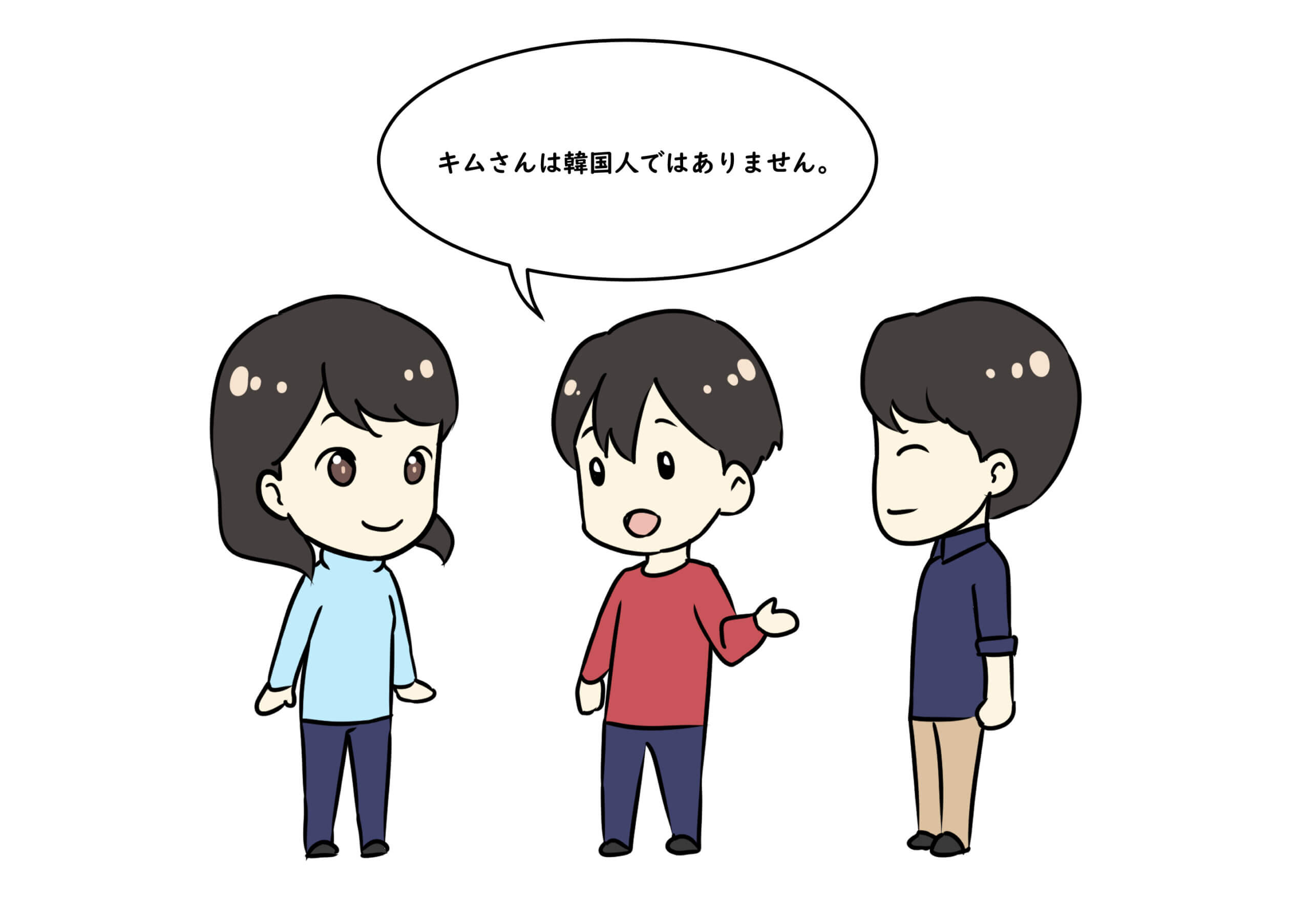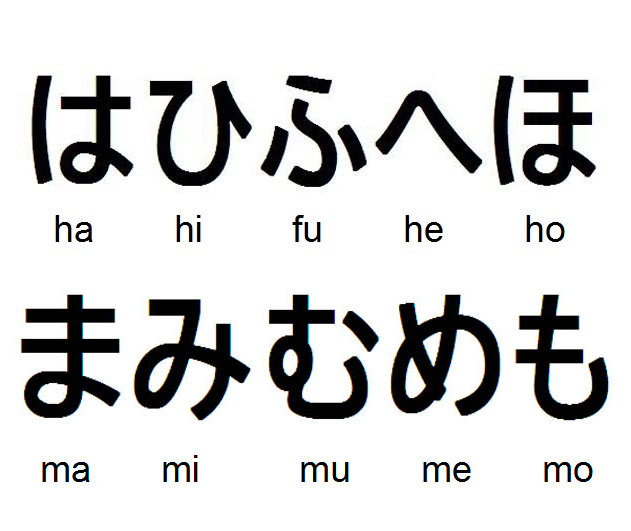
Ore Wa Inu Dewa Arimasen! 11 Ore Wa Inu Dewa Arimasen! Chapter 11
A copula is a word meaning "to be", and is used to predicate a sentence, giving the subject identity, properties, state, or membership in a group. Unlike in English, however, the Japanese copula can't be used to show existence - instead you must use the verbs いる (iru) for animate beings and ある (aru) for inanimate objects.

Ore Wa Inu Dewa Arimasen! 13 Ore Wa Inu Dewa Arimasen! Chapter 13
Dewa arimasen is the polite counterpart used in more formal writing and speech. You would use this in a business setting or official documents. Let's compare: Casual: Watashi wa gakusei ja arimasen (I'm not a student - casual) Polite: Watashi wa gakusei dewa arimasen (I'm not a student - polite)

Basic structure MLC Japanese Language School in Tokyo
the dog next door; next door's dog. An example of an - na adjective is げんき genki (healthy, vigorous, energetic…) 元気 げんき な 犬 いぬ. genki na inu. an energetic dog. You only use the な na ending when placed before nouns. Therefore, some words will simply have to be memorized as - na adjectives.

Baca Ore wa Inu Dewa Arimasen! Chapter 1 Bahasa Indonesia Komik Station
https://bit.ly/2RWopHV Click here to start learning Japanese with the best free online resources ↓ Check How Below ↓Step 1: Go to https://bit.ly/2RWopHVStep.

Ore Wa Inu Dewa Arimasen! 5 Ore Wa Inu Dewa Arimasen! Chapter 5 Ore
Hiragana: ではありません Katakana: デハアリマセン Romaji: dewa arimasen English Meaning: is/am/are not (polite) Example Sentences: あなたのせいではありません。 anata no sē dewa arimasen. It's not your fault. [Show Details] 人生は楽ではありません。 jinsē wa raku dewa arimasen. Life isn't easy. [Show Details] それはあまりよく練られた計画ではありませんでした。

อ่านการ์ตูน Ore Wa Inu Dewa Arimasen! 5 TH แปลไทย อัพเดทรวดเร็วทันใจที่
Negative Form: Hiragana/Katakana. / くろではありませんでした。(kuro dewa arimasen deshita) Colors in Japanese: Adjective Form. As I mentioned earlier, the primary noun colors also have an adjective form. Let's take a look at these. Adjective Colors. English Kanji

dewa arimasen (tidak / bukan ) Belajar Bahasa Jepang Kepo Jepang
Japanese Contact Noun じゃありません To negate a statement of the form X wa Y desu, where Y is a noun, you replace desu with ja arimasen. やまださんはがくせいじゃありません。 Mr. Yamada is not a student. yamada san wa gakusee ja arimasen.

Ore Wa Inu Dewa Arimasen! 8 Ore Wa Inu Dewa Arimasen! Chapter 8 Ore
5.1 Good. 5.2 So-So. 5.3 Not Good. 5.4 Thank You for Your Concern. 6 Other Basic Greetings in the Japanese Language. 6.1 Standard Form. 6.2 Informal and Abbreviated Form. 6.3 Casual and Easy-Going Form. 7 "How Are You" in Japanese and The Gifting Customs.

Dewa Arimasen
tsumarana i: boring. muzukashi i: difficult. kirei na: beautiful. kantan na: easy. raku na: effortless. taihen na: hard. Basic Rules. i-adjectives - "i" + katta desu = past tense. i-adjectives are the adjectives ends with "i" when it modifies a noun.

Ore Wa Inu Dewa Arimasen 19.3 Ore Wa Inu Dewa Arimasen Chapter 19.3
2 This is the sentence: 私は韓国人 では ありません。 Watashi wa kangokujin de wa arimasen. I'm not Korean. I was expecting something like: 私は韓国人ありません。 Watashi wa kangokujin arimasen. Why is the では necessary? And what does it mean? grammar particles Share Improve this question Follow asked Apr 29, 2018 at 5:39 wyc 233 1 3 8 Add a comment 2 Answers Sorted by: 4

Aprendiendo Japonés con Sami Sensei Lección 4 Partícula NO, negación
#1 Hello everybody: I'm currently trying to learn japanese, but i'm so lost that i can't even tell the difference between hiragana, katakana and kanji. And i would appreciate if you could help me out on this one: Which of the three above is used to write Dewa-arimasen and how do you write it in japanese? Thank you all!! W Wishfull Banned Japanese

Deimosu, watashi wa shota dewa arimasen! by MeruKeepAlive on DeviantArt
There are a few exceptions, but generally, most i-adjectives are written in hiragana or a single kanji character followed by an い. Here are some of the most common and familiar i. ではなかった (dewa nakatta) → ではありませんでした (dewa arimasen deshita) These is another form that is a little less formal (but still polite.

Ore Wa Inu Dewa Arimasen! 13 Ore Wa Inu Dewa Arimasen! Chapter 13
Dewa Nai(ではない) and Dewa Arimasen(ではありません) Now that we have made a few simple sentences that express a positive state of being (e.g. "I am Mr. Satō," and "This is a sushi restaurant."), let's learn the words that express a negative state of being. Dewa nai and dewa arimasen have the opposite meaning of da and desu.

อ่าน Akuyaku Reijou Level 99 Watashi wa UraBoss desu ga Maou de wa
Sore wa kare no kazoku no hon dewa arimasen. pen: pen. hon: book. dare no: whose. Basic Rules Articles and Nouns. Japanese language does not have articles (a, an, the). You can assume that nouns don't change the form. Basically, there is no plural form, and no gender (feminine, masculine, neuter etc.).

Ore wa Inu dewa Arimasen! / Манга
What is an Adjective? Linguistically, adjectives are not as fundamental as nouns and verbs, and depending on the language, might behave more like one or the other. Either way, they serve two main functions: As noun modifiers - where the adjective is adjacent to the noun

Ore Wa Inu Dewa Arimasen! 12 Ore Wa Inu Dewa Arimasen! Chapter 12
This is THE place to start if you want to start learning Japanese. Click below to start learning Japanese with the best free online resources ↓ Check How Below ↓. Go to JapanesePod101.com Step 2: Sign up for a Free Lifetime Account - No money, No credit card required Step 3: Learn with the best online resources and quickly become.